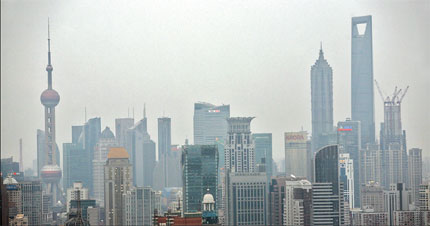China revises air quality standards
The State Council on Wednesday passed revised air quality standards which include an index for PM2.5, or or fine particulate matter 2.5 microns or less in diameter.
The new standards include indices for the concentration of PM2.5 and ozone (O3) over a period of eight hours, according to a statement from the State Council issued after a meeting presided over by Premier Wen Jiabao.
 |
|
Highrises from both Puxi and Pudong are seen during overcast weather yesterday in Shanghai. |
However, the statement did not reveal the details of the two indices.
In 2012, the monitoring of PM2.5 and O3 will be conducted in four municipalities, 27 provincial capitals, as well as three key regions -- east China's Yangtze River Delta, south China's Pearl River Delta, and Beijing-Tianjin-Hebei area in the north, the statement said.
In 2013, the monitoring will be extended to 113 model cities on the state environmental protection list, and to all cities at prefecture level or above in 2015, the statement said.
Air quality across China has remained stable over the past five years and in some cities it has seen improvements with the concentration of SO2 and PM10 reducing, the statement said.
However, the situation remains tough as the total pollutant emissions are still large and air pollution in some regions is serious, it said.
"We need firmer resolution and more effective measures, under higher standards, to remedy air pollution and steadily improve air quality," the statement said.
The country will continue cutting highly-polluting industrial projects in power supply, steel, building materials, metal, petrochemical and chemistry industries, it said.
In the Yangtze River Delta, the Pearl River Delta, and Beijing-Tianjin-Hebei area, China will actively promote clean energy, relocate highly-polluting industrial projects out of populous urban areas and introduce eco-friendly technologies into these projects, it said.
In these key areas, the country will raise pollutant emission standards and stop building thermal power plants, steel and cement factories, the statement said.
The government will continue national campaigns of reducing emissions of sulfur dioxide from power plants, steel and petrochemical factories and nitrogen oxides from cement factories.
In the statement, the State Council also pledged to improve the quality of gasoline and raise the auto exhausts emissions standard.
By 2015, all vehicles registered before 2005 that fail to meet the current emissions standard must not be driven on public roads, the statement added.

